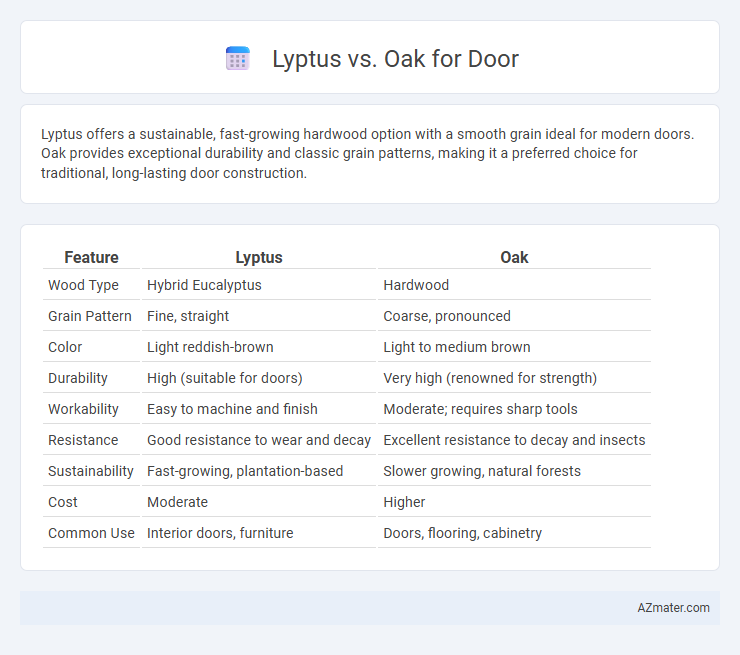Lyptus offers a sustainable, fast-growing hardwood option with a smooth grain ideal for modern doors. Oak provides exceptional durability and classic grain patterns, making it a preferred choice for traditional, long-lasting door construction.
Table of Comparison
| Feature | Lyptus | Oak |
|---|---|---|
| Wood Type | Hybrid Eucalyptus | Hardwood |
| Grain Pattern | Fine, straight | Coarse, pronounced |
| Color | Light reddish-brown | Light to medium brown |
| Durability | High (suitable for doors) | Very high (renowned for strength) |
| Workability | Easy to machine and finish | Moderate; requires sharp tools |
| Resistance | Good resistance to wear and decay | Excellent resistance to decay and insects |
| Sustainability | Fast-growing, plantation-based | Slower growing, natural forests |
| Cost | Moderate | Higher |
| Common Use | Interior doors, furniture | Doors, flooring, cabinetry |
Introduction to Lyptus and Oak for Doors
Lyptus is a fast-growing hardwood hybrid derived from Eucalyptus trees, prized for its consistent grain, smooth finish, and eco-friendly credentials, making it an excellent choice for modern doors. Oak, a traditional hardwood with a dense grain and robust durability, offers timeless strength and natural resistance, commonly used in high-quality door construction. Choosing between Lyptus and Oak for doors depends on preferences for sustainability, aesthetic uniformity, and long-term resilience.
Key Characteristics of Lyptus Wood
Lyptus wood is a fast-growing hybrid eucalyptus known for its durability, smooth grain, and rich reddish hue, making it an eco-friendly alternative to traditional hardwoods like oak. Its high density and resistance to wear ensure longevity and stability for door construction, while the uniform texture allows for a fine finish and minimal warping. Compared to oak, Lyptus offers a sustainable option with comparable strength and aesthetic appeal, ideal for contemporary door designs.
Distinctive Features of Oak Wood
Oak wood is renowned for its durability and prominent grain patterns, making it a popular choice for door construction where strength and aesthetics are essential. Its high density and natural resistance to wear and impact provide superior longevity compared to softer woods like Lyptus. Oak's ability to take stains and finishes evenly enhances the door's visual appeal, offering timeless elegance and versatility in design.
Appearance: Grain, Color, and Texture Comparison
Lyptus doors feature a fine, uniform grain with a smooth texture and a consistent reddish-brown color that deepens over time, offering a sleek, modern look. Oak doors display a more pronounced, open grain pattern with natural variations, ranging from light golden to medium brown hues, lending a traditional and rustic appearance. The choice between Lyptus and Oak hinges on desired aesthetic: Lyptus provides a more contemporary, even finish, while Oak delivers distinctive grain character and warmth.
Durability and Strength: Lyptus vs Oak
Lyptus wood offers impressive durability and strength, comparable to traditional hardwoods, making it a viable option for doors that require resistance to wear and impact. Oak, renowned for its exceptional hardness and dense grain structure, provides superior strength and long-lasting durability, often preferred for heavy-use doors. While Lyptus is fast-growing and sustainable, oak remains the benchmark for premium door strength and durability in both residential and commercial applications.
Sustainability and Environmental Impact
Lyptus wood, harvested from fast-growing Eucalyptus trees, offers a highly sustainable alternative to traditional hardwoods due to its rapid replenishment and responsible plantation management. Oak, while durable and long-lasting, often comes from slow-growing trees with higher environmental costs related to deforestation and habitat disruption. Choosing Lyptus for doors significantly reduces carbon footprint and supports sustainable forestry practices compared to conventional oak.
Workability: Machining, Finishing, and Installation
Lyptus offers superior workability compared to oak due to its consistent grain and uniform density, which facilitates smoother machining and reduces tool wear. Finishing Lyptus results in a sleek, even surface that readily accepts stains and sealants, enhancing aesthetic appeal while preventing blotching common in oak. Installation of Lyptus doors is simplified by its stable dimensional properties, minimizing warping and ensuring precise fitting, whereas oak's variable density can complicate these processes.
Maintenance and Longevity
Lyptus doors require minimal maintenance due to their dense, closed-grain structure which resists moisture and decay, ensuring long-term durability without frequent sealing or refinishing. Oak doors, though highly durable, often need regular maintenance such as sanding, staining, or sealing to prevent cracking and warping in fluctuating humidity conditions. Both woods offer longevity, but Lyptus provides a lower-maintenance alternative ideal for environments where upkeep is a concern.
Cost Comparison: Lyptus vs Oak Doors
Lyptus doors generally cost 20-30% less than oak doors, making them a budget-friendly alternative without sacrificing durability. Oak doors, known for their strength and classic appearance, tend to have higher material and labor costs due to the hardwood's density and grain complexity. When comparing long-term value, Lyptus offers savings upfront, while oak's higher price reflects its traditional prestige and potential for longevity.
Which Wood is Best for Your Door?
Lyptus wood offers a sustainable alternative to traditional hardwoods like oak, featuring a dense grain and natural resistance to moisture, making it suitable for durable door construction. Oak remains a classic choice known for its strength, prominent grain patterns, and superior wear resistance, ideal for doors requiring long-lasting performance and aesthetic appeal. Choosing between Lyptus and oak for your door depends on balancing environmental considerations with desired durability, appearance, and budget constraints.

Infographic: Lyptus vs Oak for Door
 azmater.com
azmater.com